Brian Weinberger, an attorney, had been addicted to alcohol and pills for more than a decade until his wife learned of his problem. “The things that I had been hiding came out, and that caused a tremendous upheaval in my family and personally,” said Weinberger, 55, who lives in Scottsdale, Ariz., and has five children.
About 15 years ago, he entered recovery. He still attends Alcoholics Anonymous meetings every week, and in 2013, started participating in a support group organized by Rabbi Mendy Lipskier, who started the Jewish Recovery Fellowship of Arizona the year before.
After meeting people grappling with addiction, like Weinberger, who either are in recovery or should be in recovery, Lipskier says he "felt that there was so much that the Torah can add to a 12-step program, so I decided to try to fuse the two together.”
In meetings with addicts, Lipskier, who co-directs Chabad Lubavitch of Fountain Hills with his wife, Tzipi, learned that many of them do not attend events that revolve around drinking because they could potentially relapse. One such example occurs on Purim, a holiday where Jews are instructed to drink until they can’t tell the difference between Haman, who tried to annihilate Jews in Persia during the fourth century BCE, and Mordechai, the Jewish man who fought to save his people.
“The idea is that Purim is all about the hidden hand of G‑d behind all the events; it was a tremendous miracle that the Jews were saved,” explains the rabbi. “On Purim, we are celebrating and trying to internalize this message, and one of the ways to do that is to drink alcohol, and to suspend our rational thinking and recognize that there is something super-rational about faith that goes beyond reason.”
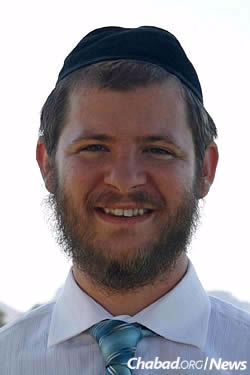
But addicts can’t take part in such a tradition.
With that in mind, Lipskier and other rabbis have organized Purim parties where Jews in recovery can participate in the holiday with the same spirit found at other parties (but without actual spirits), so they will not be uncomfortable. This year, the event takes place on Sunday afternoon with a “Purim in Russia” theme, complete with music by the Arizona Balalaik Orchestra.
“For an addict, drinking can literally mean the end of their life; it’s that severe. For an addict to drink on Purim, it would be far from a mitzvah—it would be the opposite of a mitzvah,” says Lipskier.
Chabad rabbis in Michigan, Pennsylvania and in a number of other sites around the world will be hosting similar parties on Purim, which starts this year after Shabbat on March 11, and lasts through Sunday, March 12 (in Jerusalem, Shushan Purim is celebrated the next day, on Monday, March 13).
For many of the leaders, addressing addiction has become an urgent problem. The Center for Disease Control and Prevention and other groups now describe addiction to prescription pills and heroin as an epidemic in the United States.
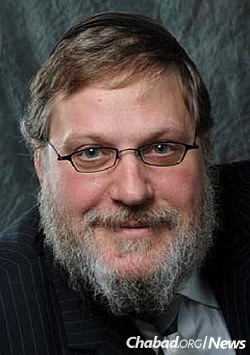
Lipskier believes that for a long time, “Jews had their heads buried in the sand and didn’t want to believe that [fellow] Jews were addicts, but this disease doesn’t discriminate. It affects all people.”
‘Peace in Your Heart’
Rabbi Yosef Lipsker, co-director of Chabad-Lubavitch of Berks County, Pa., with his wife, Chana, has been working with addicts for almost two decades, and thinks that addiction has become a much more common problem in recent years.
“People are popping pills more than ever before, and today, the marijuana is a lot more potent than ever before,” he says. (He and Mendy Lipskier are related through their grandfathers, who were brothers and spelled their names differently when they entered the United States from Russia, he adds.)
In 1999, Lipsker received a phone call from a Jewish man who was staying at the nearby Caron Treatment Center in Wernersville, Pa., asking him to visit. “I thought the guy had broken his hip and was in a rehab for physical therapy,” recalls the rabbi. Very soon, he learned the real reason for the call.
And it prompted him into action.
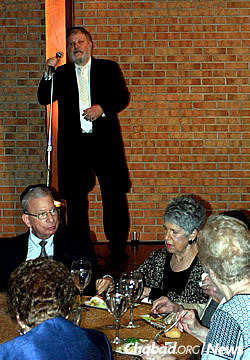
After learning more about addiction, he started hosting weekly Shabbat dinners where grape juice was served instead of wine. Many of the guests are either residents of the treatment center, or have left and returned to visit the Lipsker family. He also started organizing dry Purim parties in 2000, emphasizing that he does not think that drinking alcohol is the only method of experiencing the holiday.
“One of the reasons you are supposed to drink until you can’t tell the difference between the evil and righteous figures,” he explains, “is to realize that even the enemy is by Divine design. One should realize that the hand of G‑d is behind everything. This should curtail anger and rage, which is a normal reaction when you see your enemy; you don’t feel anger. For those who must not drink alcohol—for whatever reason—this idea, of having peace in your heart, can be accomplished without drinking.”
His belief is that people of all ages enjoy these dry parties and dinners. In fact, he says: “One man told me that for the first time in his adult life, he had fun without drinking alcohol.”
Their annual “sober” Purim party will take place on Sunday afternoon.
But another big event is in the works this month: a gala banquet on Sunday, March 26, called ”Celebrating Hope,” highlighting Chabad’s work with recovering addicts over nearly 20 years. Parents, families, students, community members and those affiliated with the Caron Treatment Center are invited to attend. The featured speaker will be national radio talk-show host Dennis Prager.

“With the help of our partners and supporters, we continue to provide hope and transform lives—from the depths of despair to the heights of joy and meaning,” says Lipsker. “Each and every day, we strive to unleash the power of hope.”
Those helped along the way support that sentiment. Says Brian C.: “There was so much uncertainty throughout this struggle, yet somehow, after I hung up the phone with the rabbi, I knew it would be alright.”
This is an updated version of an article first published here.

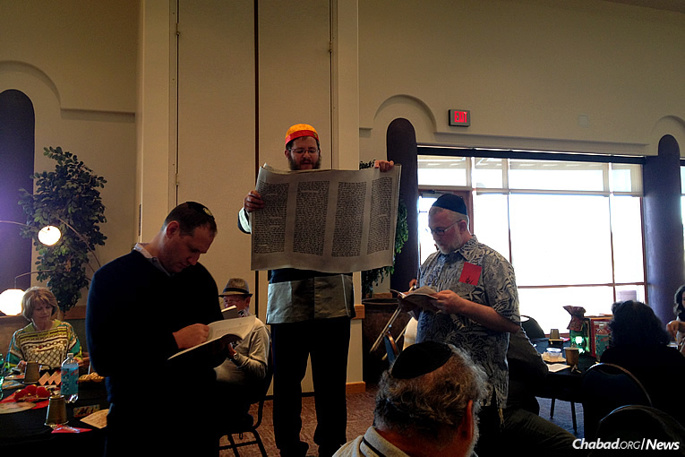

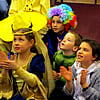




Join the Discussion